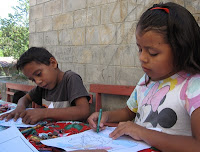Sunday School Required
 One of the rules which the scholarship program directiva has set up in our sister community is this: Kids in the scholarship program must attend Sunday School.
One of the rules which the scholarship program directiva has set up in our sister community is this: Kids in the scholarship program must attend Sunday School.The merging of church and public education in El Salvador is a little different from our North American education experience. Prayer and celebration of Christian holidays is part of public school life, and part of the culture that Europeans brought to the country. The scholarship program allows church resources to help kids to go to public schools, and it is OK to ask kids to attend Sunday School. Parents do not have a problem with this. Sending their kindergarten through sixth grade kids to a wholesome, Bible-centered, safe place on Sunday morning is wonderful, and it's a known expectation from the beginning. For the kids, hanging out with the Lutherans, whether their parents are Roman Catholic or Pentecostal or members of the the Baptist Biblical Tabernacle Friends of Israel, is no big deal. Sunday School is fun. Kids pray, they sing, they act out stories, they memorize stuff (and have fun doing it!), they color, they have small group
 youth leaders who are cool, and they get a snack.
youth leaders who are cool, and they get a snack. I have learned a lot by going to Sunday School in El Salvador. I have learned that you can use an action figure as John the Baptist and a kid as Jesus and dirt as the river Jordan. I have learned that punching holes in the Bible page, putting yarn through it and hanging it onto a kid will help that kid not to lose the page on the way home. I have learned that the skills used in teaching 80 kids in a one-room-schoolhouse style Sunday School in El
 Salvador transfer really well to an urban setting in the US, and that we need to invite our big kids to help the little kids more often. I have learned that if you make anything a contest, it is more fun, even studying the Small Catechism. I have learned that kids never tire of coloring. I have learned that sharing lesson plans across cultures and language is fun and is totally worth the effort.
Salvador transfer really well to an urban setting in the US, and that we need to invite our big kids to help the little kids more often. I have learned that if you make anything a contest, it is more fun, even studying the Small Catechism. I have learned that kids never tire of coloring. I have learned that sharing lesson plans across cultures and language is fun and is totally worth the effort.It is good for the scholarship kids and for all of the children in the community that they have a place in which they receive love, give thanks, are safe, make friends of all ages and are encouraged in their weekday studies.



Comments
Post a Comment